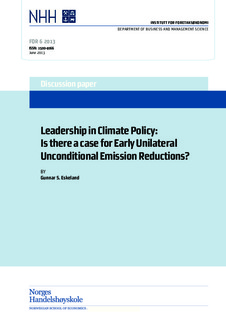| dc.description.abstract | One may misread economic theory on climate policy to provide a warning against unilateral
mitigation. While important lessons are drawn from ‘global problems require global solutions’, these
say little about what to do in a phase before or without a global agreement - or with weak ones. In the
literature on cooperation and leadership in provision of public goods, early provision may stimulate
provision from others. A key to leadership is signaling; an early mover has private information and is
motivated in part by knowing that others will follow. Others will follow if they understand that the
early mover demonstrates that emission reductions are feasible and adoptable. Our analysis finds that
early movers will be cognizant of what they need to demonstrate, and they will be concerned about
and act on carbon leakage. Leadership can be deterred by concerns for free riding, but this is more
likely for a country or coalition that is large in terms of emissions and face others who are both large
and vulnerable to climate change. We suggest leadership is possible early in this century: numbers
indicate that few – if any - need find themselves deterred from early action of some sort. | nb_NO |
